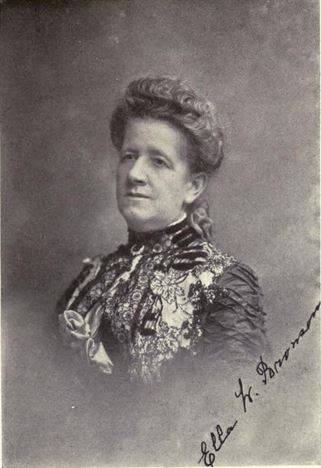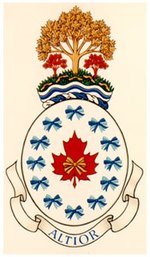
Civic Leader and Women’s Health Pioneer: Ella Hobday Webster Bronson
Section 50, Lots 119, 120, 128
Ella Hobday Webster was born on September 1, 1846 in Portsmouth, Virginia to Nathan Burnham Webster a prominent Southern American educator. The family moved to Ottawa in 1862, where, at some point, Bronson met her future husband, Erskine Bronson. The couple married in Virginia in 1874, before returning to the Canadian capital and starting a family.
Bronson focused on her role as a mother, and began her public career in earnest only after her primary domestic and child-raising duties were behind her. Between 1890 and 1892 Bronson served on several informal committees to furnish the new nurses’ institute building. She was also treasurer for funds raised to provide Ottawa soldiers with comforts during the South African War.
A staunch member of St Andrew’s Presbyterian Church, she was active in its women’s missionary society and sat on a number of committees.
In 1893 Ella Bronson answered a call from Lady Aberdeen to help establish the National Council of Women of Canada. Although she served as a delegate to several national conventions, she was more consistently involved at the local level, where most of the council’s work was centred. Local councils were associated with the national one in a loose federation. These councils served to educate potential female leaders such as Bronson; through them, women learned about the economic and social needs of their community and acquired a network of female contacts; they also provided a legitimate forum from which women could exercise authority and defend the Christian family as they saw it.
The National Council of Women of Canada is a Canadian advocacy organization based in Ottawa, Ontario, aimed at improving conditions for women, families, and communities. A federation of nationally-organized societies of men and women and local and provincial councils of women, it is the Canadian member of the International Council of Women (ICW). The Council has concerned itself in areas including women's suffrage, immigration, health care, education, mass media, the environment, and many others. Formed on October 27, 1893 in Toronto, Ontario, it is one of the oldest advocacy organizations in the country. Lady Aberdeen was elected the first president of the National Council of Women of Canada in 1893. Prominent Council leaders included Lady Gzowski, Dr. Augusta Stowe-Gullen, and Adelaide Hoodless.
A vice-president of the Ottawa Local Council of Women from 1894 until 1911, Bronson served on committees to lobby for the teaching of domestic science in the city’s high schools, the creation of a free library system, and the establishment of cottages for consumptives. In 1894 she pioneered the Associated Charities of Ottawa, a scheme intended to coordinate the efforts of various agencies, set standards for recipients of charity, and provide work-placement programs for the unemployed.
The culmination of Bronson’s public projects was the foundation and successful operation of the Ottawa Maternity Hospital. With Bronson as president and an all-female board of directors, the hospital opened in 1895, and it functioned until the mid 1920s, when it was absorbed into the Civic Hospital. Much of its funding was raised by Bronson through her contacts in the elites of government and the lumber industry, and she served as its president for nearly 30 years.
Fashioned on a new, medical, model of hospital, the Ottawa Maternity Hospital provided obstetrical services to women, most of whom paid a small fee. It eschewed any religious agenda, although it accepted support from church groups, and did not concern itself with its patients’ moral purity as some institutions did. Professionalism was stressed, and from 1897 a three-month certification course was offered for nurses from other hospitals. They were educated in post-natal medical and nutritional care for new mothers as well as in pre-natal and obstetrical matters. By the hospital’s 25th anniversary in 1920, it had trained 600 nurses, and by its closing it had served more than 10,000 patients.
On 3 Feb. 1925 Ella Bronson signed over its property to the city; she took ill the next day and died a week later. Ella Bronson’s contribution to her community, in a private life of duty and kindness and a high-profile public career, was representative of that made by a legion of women who were intent on reshaping society. The Ottawa Journal commemorated her life of engagement when it praised her as “a notable figure, who had given her best in public service.” Bronson died on February 11, 1925.


